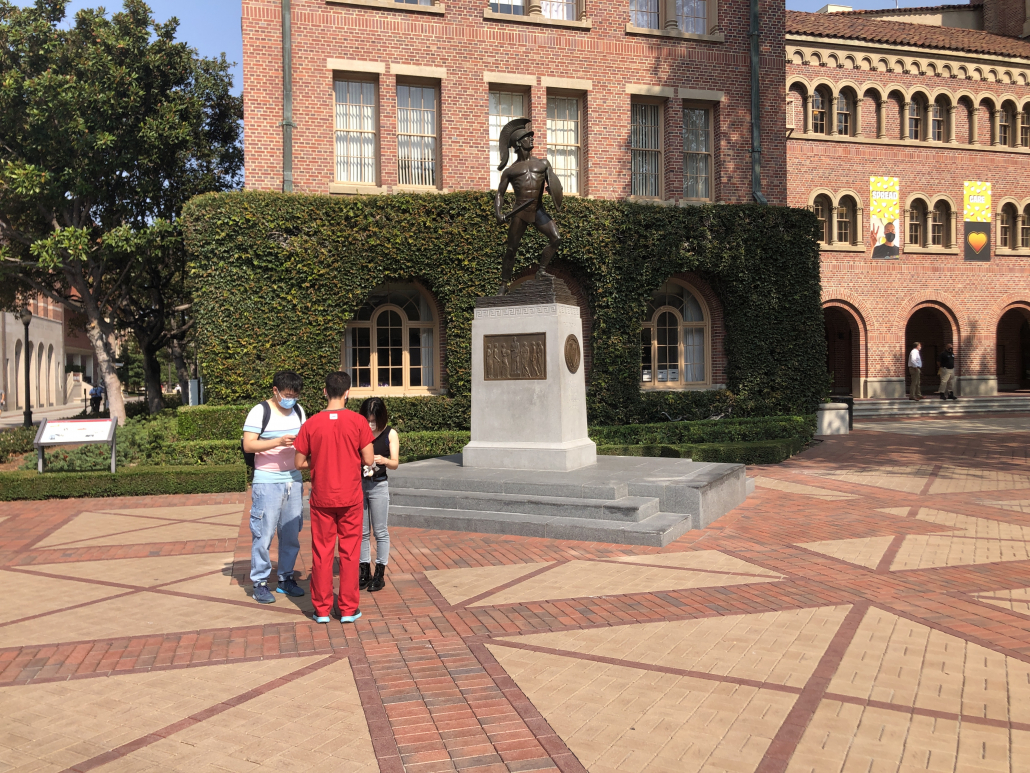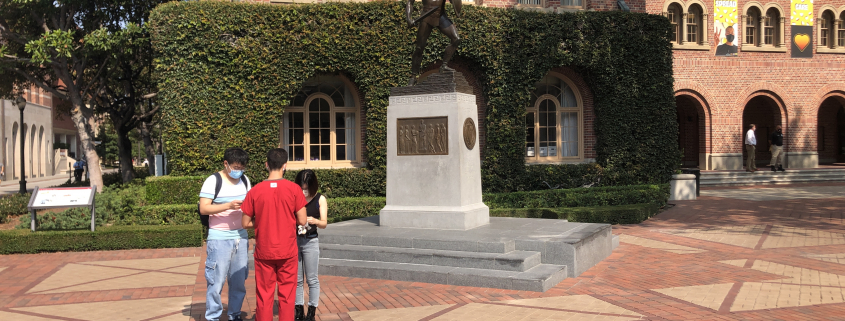Keck Medicine of USC nurses continue action against work conditions

Nearly a month after striking for two days in mid-July, Keck Medicine of USC nurses regathered to draw attention to understaffing and patient safety concerns Monday ahead of contract negotiations with Keck Aug. 17 and 18.
As students moved into campus and families took pictures in front of Tommy Trojan ahead of welcome week, nurses on the University Park Campus stopped parents and students to hand out fliers that read “Put a stop to USC’s greed” and “Put patients first,” citing their difficult working conditions, USC’s “mishandling” of the George Tyndall accusations and the tuition increases despite online courses over the past two school years.
At the same time, nurses at UPC delivered a letter to President Carol Folt requesting a meeting about patient safety concerns while nurses on the Health Sciences Campus delivered a similar letter to Keck Medicine’s Senior Vice President for Health Affairs Dr. Steven Shapiro. Nurses who did not attend the in-person events sent emails to Folt and Shapiro at 10 a.m.
The letter delivered to Folt and Shapiro emphasized Keck’s declining hospital rankings in U.S. News, high employee turnover, low morale, understaffing and caring for sick patients.
Michael Simonton, a nurse who works in the ICU at Keck, said in an interview with the Daily Trojan that the action was motivated by a lack of progress since the strike.
“Since we went on strike, staffing has been just as poor,” Simonton said. “There hasn’t been a week since the strike where I haven’t missed a break, or where I haven’t missed a lunch because we don’t have the appropriate level of staffing.”
Since mid-July, nurses have criticized Keck Medicine’s over reliance on contract nurses — nurses who work at hospitals for short periods of time — in order to follow California law that requires one nurse for every two patients.
Joe Keluke, a nurse who has worked at Keck in the abdominal transplant ICU for six and a half years, said that contract nurses often receive “a day” of training, while permanent nurses “had years of training.”
“We want more of a commitment from the hospital to hire more USC nurses — not temporary nurses — that are getting maybe a day of training for a heart or liver transplant,” Keluke said.
In a statement to the Daily Trojan, Keck Medicine said they are “hopeful” for new contract negotiations, emphasized an “A” hospital safety grade and denied being understaffed.
“Keck Medical Center of USC is recognized locally and nationally for its patient safety, which includes high levels of staffing that meet and often exceed nurse-to patient-ratio requirements,” the statement said.
Keluke, who collected more than 200 Assignment Despite Objection forms — forms in which nurses may use to “object to an unsafe, or potentially unsafe, patient care assignment”— left the forms with Folt’s secretary when he dropped off the demand letter. Nurses are often put into situations where, if they don’t work long hours, patients will not have adequate care, Keluke said.
“We have nurses that are almost forced, or they’re pressured, to stay 18 hours caring for the sickest patients in our hospital,” Keluke said. “While they’re not forced to work 18 hours, they feel that they have to stay because, if they don’t, there’s not going to be another nurse for that patient.”
Mandy Poppin, who has worked as a nurse at Keck for 10 years where they perform heart and lung transplants and monitor heart devices, said understaffing has decreased the quality of care for patients, “especially [those on] our heart devices.”
“We all know that patients are human beings in the bed[s] … And they benefit by having an appropriately trained nurse looking out after them, caring for them and being their advocate. That’s our role,” Poppin said.
Rudy Weller, who has worked in the Keck Hospital cardiothoracic unit for 25 years, said nurses are pushing the hospital to require 10 hours in between shifts to ensure better patient care.
“Nurses are not getting the proper rest periods. They’re on call for long hours. Sometimes they go beyond 20 hours, and they [have] to come back the following day,” Weller said. “Surgery is a serious matter, so we want to make sure that our nurses are alert when they come back to work.”
If Keck refuses to address their demands “nurses of USC are probably going to give notice that we’re going to go on strike again,” Simonton said.
The problem, Weller said, comes down to an unwillingness to adequately staff the hospital.
“We’re understaffed every single day,” he said. “And that’s the problem we’re having because during negotiations the hospital has refused to commit to hire more nurses, which is the root of the problem.”

